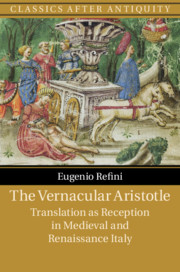Book contents
- The Vernacular Aristotle
- Classics after Antiquity
- The Vernacular Aristotle
- Copyright page
- Dedication
- Contents
- Figures
- Series Editors’ Preface
- Acknowledgements
- Notes on the Text
- Introduction
- Chapter 1 Taming the Philosopher
- Chapter 2 The Master of Those Who Know (and Those Who Don’t)
- Chapter 3 Family BusinessReadying the Ethics for the Layman
- Chapter 4 The Philosopher, the Humanist, the Translator and the Reader
- Chapter 5 Abridging the Philosopher(s)
- Conclusion
- Bibliography
- Index
Chapter 1 - Taming the Philosopher
Published online by Cambridge University Press: 10 February 2020
- The Vernacular Aristotle
- Classics after Antiquity
- The Vernacular Aristotle
- Copyright page
- Dedication
- Contents
- Figures
- Series Editors’ Preface
- Acknowledgements
- Notes on the Text
- Introduction
- Chapter 1 Taming the Philosopher
- Chapter 2 The Master of Those Who Know (and Those Who Don’t)
- Chapter 3 Family BusinessReadying the Ethics for the Layman
- Chapter 4 The Philosopher, the Humanist, the Translator and the Reader
- Chapter 5 Abridging the Philosopher(s)
- Conclusion
- Bibliography
- Index
Summary
Chapter 1 proposes to read the anecdote of Aristotle mounted by the courtesan Phyllis as relevant to the interaction of Latin academic practices and vernacular culture. By building on the idea that the taming of the philosopher stages the conflict between the ‘artificial’ culture of academic learning and concurrent ideas about Nature, I argue that some versions of the story (e.g, the Lai d’Aristote) relate to the medieval reflection on the ethical worth of the mother tongue. To this end, I compare the iconography of the mounted Aristotle to the depiction of Grammar, whose ‘bilingual’ status mirrors the ambiguous place that the vernacular holds vis-à-vis Latin in the age of Dante, Petrarch and Boccaccio. The chapter then looks at other spaces (both textual and visual) for the translation of the philosophical ideals embodied by Aristotle. In different ways, both the novella tradition (e.g., Novellino and Decameron) and the visual display of civic values (e.g., the painted cycles of San Gimignano, Siena and Asciano) shed light on the ways in which the appropriation of Aristotle shaped the new vernacular societies while also being part of wider discussions about linguistic difference.
Keywords
- Type
- Chapter
- Information
- The Vernacular AristotleTranslation as Reception in Medieval and Renaissance Italy, pp. 17 - 50Publisher: Cambridge University PressPrint publication year: 2020

